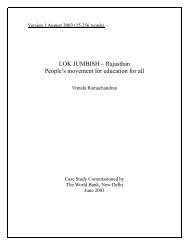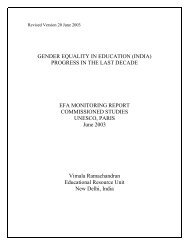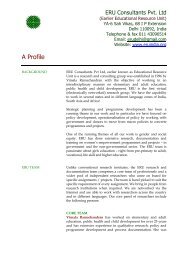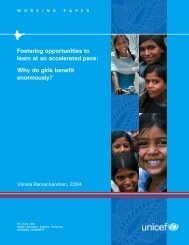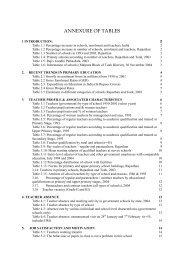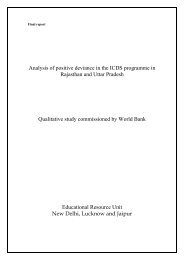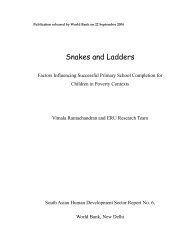primary school teachers the twists and turns of everyday practice
primary school teachers the twists and turns of everyday practice
primary school teachers the twists and turns of everyday practice
You also want an ePaper? Increase the reach of your titles
YUMPU automatically turns print PDFs into web optimized ePapers that Google loves.
Version 20 Oct 08, edited final<br />
• <strong>the</strong> culture <strong>of</strong> teaching, that is, <strong>teachers</strong>’ pr<strong>of</strong>essional relationships with o<strong>the</strong>rs<br />
within <strong>the</strong> system.<br />
Innate to this conceptualisation is <strong>the</strong> underst<strong>and</strong>ing that <strong>teachers</strong>’ mastery <strong>of</strong> subject<br />
matter <strong>and</strong> pedagogical skills, though important, are not <strong>the</strong> only elements that<br />
contribute to effective teaching. This approach recognises, first, that <strong>teachers</strong> are<br />
human beings who ‘do not come empty-h<strong>and</strong>ed, <strong>the</strong>y bring much baggage in <strong>the</strong><br />
form <strong>of</strong> images, ideas <strong>and</strong> experiences about teaching. One task (…) is to help <strong>the</strong>m<br />
unpack <strong>and</strong> articulate <strong>the</strong>se, so some can be thrown away, o<strong>the</strong>rs refashioned or<br />
replaced’ (Lewin <strong>and</strong> Stuart 2003)—a process that requires <strong>the</strong> provision <strong>of</strong><br />
opportunities to engage in continuous, <strong>practice</strong>-based reflection on educational<br />
purposes <strong>and</strong> processes. It recognises, second, that <strong>teachers</strong>’ <strong>practice</strong> depends not<br />
only on <strong>the</strong>ir own abilities or even desire to teach well, but in equal measure on <strong>the</strong><br />
conditions, expectations <strong>and</strong> rules <strong>of</strong> engagement—both formal <strong>and</strong> informal, stated<br />
<strong>and</strong> unstated—<strong>of</strong> <strong>the</strong>ir working environment.<br />
While <strong>the</strong> above discussion provides an overview <strong>of</strong> <strong>the</strong> kinds <strong>of</strong> issues that teacher<br />
development policies <strong>and</strong> programmes should address, <strong>the</strong> process <strong>of</strong> design <strong>of</strong><br />
<strong>the</strong>se policies is ano<strong>the</strong>r important area to keep in mind. Two elements vital to <strong>the</strong><br />
design process are highlighted below.<br />
First, to what extent are <strong>teachers</strong> <strong>the</strong>mselves involved in policy formulation? If<br />
<strong>teachers</strong> are mere recipients <strong>and</strong> implementing agents <strong>of</strong> curricula <strong>and</strong> textbooks<br />
produced elsewhere, <strong>the</strong>se are unlikely to address <strong>the</strong>ir real needs. Nor does a topdown<br />
design process model <strong>the</strong> participatory, interactive process that <strong>teachers</strong> are<br />
subsequently expected to engage in within <strong>the</strong> classroom as a central aspect <strong>of</strong> a<br />
constructivist educational pedagogy. An influential review <strong>of</strong> teacher development<br />
<strong>practice</strong>s in five countries concluded:<br />
When <strong>teachers</strong> are actively involved <strong>and</strong> empowered in <strong>the</strong> reform <strong>of</strong> <strong>the</strong>ir own <strong>school</strong>s,<br />
curriculum, pedagogy, <strong>and</strong> classrooms, even those with minimal formal education <strong>and</strong><br />
training are capable <strong>of</strong> dramatically changing <strong>the</strong>ir teaching behavior, <strong>the</strong> classroom<br />
environment, <strong>and</strong> improving student achievement. Conversely, when <strong>teachers</strong> are<br />
ignored, or when reforms come from above or are not connected to <strong>the</strong> daily realities <strong>of</strong><br />
<strong>the</strong> classroom <strong>and</strong> local environment, even <strong>the</strong> most expensive <strong>and</strong> well designed<br />
interventions are almost certain to fail (Craig et al, 1998).<br />
Second, to what extent do educational policies encompass a comprehensive <strong>and</strong><br />
integrated response to <strong>the</strong> diverse set <strong>of</strong> factors known to affect teacher<br />
development?<br />
The policy environment in which <strong>teachers</strong> work sends a myriad <strong>of</strong> <strong>of</strong>ten conflicting<br />
signals about how <strong>school</strong>s are expected to do business <strong>and</strong> about what behaviors <strong>and</strong><br />
skills are valued <strong>and</strong> rewarded. Messages about more- or less-preferred teaching<br />
<strong>practice</strong>s <strong>and</strong> learner outcomes issue from all <strong>of</strong> <strong>the</strong> major education policy domains,<br />
including those that shape curriculum, assessment, teacher <strong>and</strong> administrator licensing<br />
<strong>and</strong> evaluation, <strong>and</strong> accountability. Existing policies <strong>and</strong> <strong>practice</strong>s must be assessed in<br />
terms <strong>of</strong> <strong>the</strong>ir compatibility with two cornerstones <strong>of</strong> <strong>the</strong> reform agenda: a learnercentered<br />
view <strong>of</strong> teaching <strong>and</strong> a career-long conception <strong>of</strong> <strong>teachers</strong>' learning (Darling-<br />
Hammond <strong>and</strong> McLaughlin 1995).<br />
We have seen in <strong>the</strong> preceding sections <strong>of</strong> this chapter—<strong>and</strong> indeed throughout this<br />
booklet—that in <strong>the</strong> Indian context, <strong>the</strong>se ‘conflicting signals’ comprise a<br />
70




